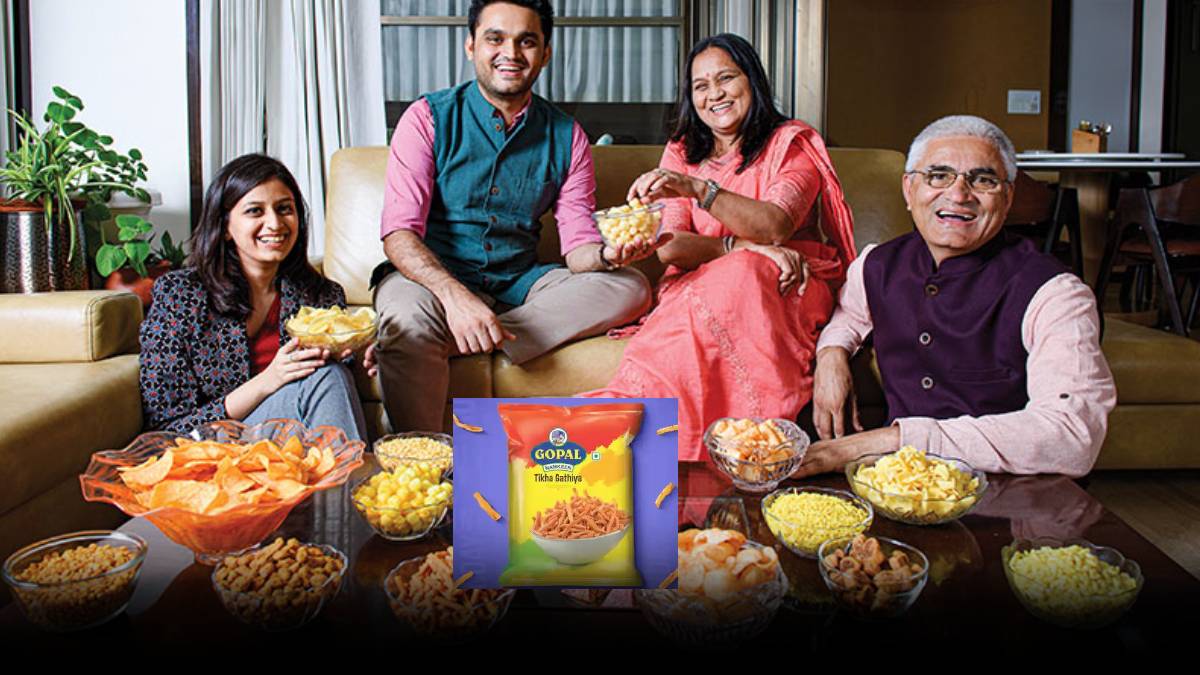Bipinbhai Hadvani’s Gopal: The Secret Behind Gopal Snack Empire

Bipinbhai Hadvani’s journey is nothing short of inspirational—a story that began with a humble cycle and a small-town dream, and led to the creation of Gopal Snacks, one of India’s largest ethnic namkeen brands.
From selling homemade snacks in Gujarat’s Bhadra village to running a ₹1,400 crore empire, Bipinbhai’s life is a testament to resilience, innovation, and an unwavering commitment to quality. Born in a close-knit community where his father’s small snack business served only local customers, young Bipinbhai Hadvani learned early on the value of hard work and authenticity. After school, he would peddle homemade Gujarati snacks on his cycle, observing firsthand the deep connection between quality products and customer loyalty. Yet, he knew that remaining in Bhadra would limit his ambitions.
In 1990, armed with ₹4,200 borrowed from his father, Bipinbhai ventured to Rajkot and launched a snack brand called Ganesh. The venture quickly gained traction, surpassing the family shop’s success. However, internal differences with a relative forced the closure of Ganesh. While many might have given up, Bipinbhai Hadvani viewed this setback as an opportunity to start anew.

In 1994, with the support of his wife and a fresh sense of purpose, he invested ₹2.5 lakhs—the amount he received for his share in Ganesh—to create Gopal Snacks. Named after Lord Krishna, the brand carried a simple but powerful mission: to sell only what he would proudly serve his own family. Initially, Bipinbhai Hadvani returned to his roots, using his cycle to deliver products and personally engage with shopkeepers. This hands-on approach not only built trust but also helped him fine-tune his offerings based on direct feedback.
By listening closely to customers, Gopal Snacks quickly identified which products resonated most. Items like Chavanu and Gathiya found a loyal audience. With sales growing steadily, Bipinbhai Hadvani moved operations to a small manufacturing unit just outside Rajkot. However, logistical challenges soon arose, as the time taken to transport goods to market started eating into profits. Always one to adapt, Bipinbhai made the bold decision to bring production back into the city in 2008. This move proved to be transformative. By 2012, Gopal Snacks had hit ₹100 crore in revenue.
What set Gopal Snacks apart was Bipinbhai’s unwavering commitment to affordability and quality. While other snack makers raised prices during challenging times, Gopal Snacks stayed true to its roots. The brand’s local, authentic flavors never wavered, even as it expanded into new markets. This consistency paid off. Between 2012 and 2017, Gopal Snacks grew sixfold, reaching ₹620 crore in revenue—without spending a single rupee on marketing.

As the brand expanded beyond Gujarat to Maharashtra, Madhya Pradesh, and Rajasthan, it faced fierce competition from established giants like Balaji Wafers. Recognizing Balaji’s dominance in the wafer segment, Bipinbhai Hadvani made a strategic choice: rather than fighting for the number one position, he focused on strengthening Gopal’s foothold in categories where it excelled. By diversifying into papads, rusks, and over 80 other snack products, Gopal Snacks solidified its reputation as a go-to brand for authentic Gujarati flavors.
Today, Gopal Snacks stands as the second-largest ethnic namkeen player in India, with a staggering 3,100 employees, seven lakh retailers, and a daily production volume of one crore packets. The company generates ₹1,394 crore in revenue and ₹112.37 crore in profits. Through it all, Bipinbhai Hadvani has remained true to the core values instilled by his father, often repeating the golden mantra: “If you want to increase business, don’t increase prices. Increase business instead.”
Under Bipinbhai’s visionary leadership, Gopal Snacks continues to delight millions of customers across 12 states, proving that with determination, adaptability, and a steadfast commitment to quality, a business can grow from humble beginnings to remarkable heights.





